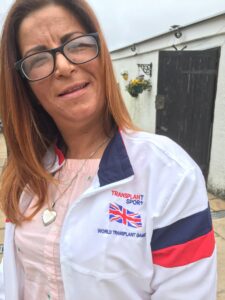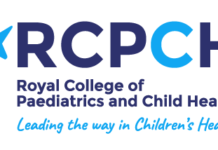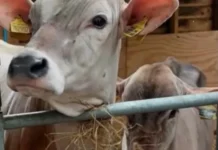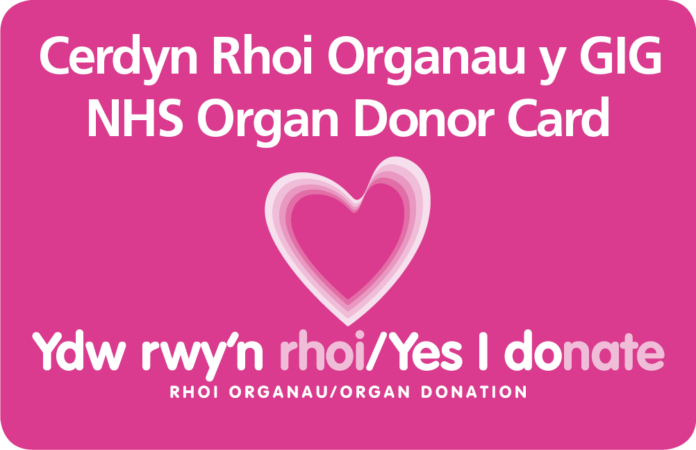This Organ Donation Week (23rd – 29th September) NHS Blood and Transplant is celebrating the fact that the NHS Organ Donor Register has been helping to save lives for 30 years through the gift of organ donation – with more than 1.3 million people in the Wales declaring their willingness to donate their organs after death.
Since the creation of the NHS Organ Donor Register in 1994, more than 100,000 people in the UK had their lives saved by an organ transplant, including more than 10,000 people in the Wales.
Although organ donation has been saving lives in the UK since the 1950’s, the NHS Organ Donor Register was created 30 years ago to promote the wider message of organ donation and allow people to record their decision to be a donor.
In the Wales, 154 patients received a lifesaving transplant from a deceased donor last year and 65 residents donated their organs after death [1]. Many of those had recorded their decision on the NHS Organ Donor Register. However, the waiting list for a transplant in the UK is higher than ever before, with 270 patients in the country still actively waiting for a lifesaving organ [2].

Tracy Jayne Baker Griffiths BEM, a civil servant from Baglan in Port Talbot, has received two kidney transplants in her lifetime.
Tracy, who is now 47 years old, was diagnosed with reflux nephropathy which led her to receiving her first transplant at the age of 11 and her second at the age of 30. She said:
“I was devastated when I found out that my first kidney had failed. I knew I had to go on dialysis, it kept me alive, but it restricts your life. When I got the second transplant I was chuffed because I knew the life I could live from having a transplant.
“Without a transplant I would’ve been stuck on dialysis for five days a week and not have been able to go on holidays or if I did go on holidays, it would’ve looked very different. Dialysis restricts you from everything and your body isn’t functioning as it should be. I know what a successful transplant can do.
“I’m so grateful to my donors for giving me a new lease of life. I wouldn’t be here without them, without what they’ve done. They’ve allowed me to work full-time, to go to the transplant games. I wouldn’t have my children if they hadn’t done this selfless act. If they were in front of me, I would hug them. There are no words for what they’ve done. I’d give them a real Welsh hug.
“Organ donors have given so many people a new lease of life. If it was for my organ donations, I couldn’t achieve everything I’ve done in my life and I’m so grateful for their generosity and giving me my life back.”
Only around 1% of people who die in the UK every year are usually able to donate their organs after death. Donors are typically those who have died in a hospital intensive care unit or emergency department due to brain injuries, cardiac arrest, or other trauma.
It is vital that everyone who wants to be a donor registers their decision on the NHS Organ Donor Register and talks it through with their families who will be expected to support their decision should the time come.
Families are far more likely to support donation when they already know it was what their relative wanted. Almost 90% of people honoured their family members decision last year when they had either proactively registered their decision to donate on the NHS Organ Donor Register or verbally expressed a decision to be a donor.
Anthony Clarkson, Director of Organ and Tissue Donation and Transplantation, at NHS Blood and Transplant, says:
“Every day across the UK there are thousands of patients and their families, waiting for that all important life-saving call. Yet, this is often only possible as a result of another family receiving some of the hardest news they might ever have to hear.
“The change in the law now means that it’s assumed that when someone dies in circumstances where they could be a donor, that they agree to donate if they haven’t officially opted out. However, no-one is automatically added to the Organ Donor Register. You still need to confirm your own decision and your family will still be consulted before donation goes ahead and will be expected to support your decision.
“With 270 patients in Wales waiting for organ transplants, it’s more important than ever to register your organ donation decision and make it known to your family.”
This will be followed by Organ Donation Week itself where we will be back to encouraging people to register their decision on the NHS Organ Donor Register and, new for this year; GO PINK! You can wear pink, bake pink, drink pink…change your profile to pink, light up pink, encourage your children to wear pink, paint something pink, the pinkibilities are endless! The aim is to go as pink as possible, to help people really see the support for organ donation around the country, and to find out more about it. We will also be encouraging people to take time out to talk about organ donation with their family, friends
Also, look out for landmarks across Wales turning pink. This year, the UK will once again ‘Go Pink’ for Organ Donation Week. Councils, businesses, charities and famous landmarks up and down the country are turning their lights pink for the week to show their support for the thousands waiting for a transplant.
For more information, or to register your organ donation decision, please visit: www.organdonation.nhs.uk or call 0300 123 23 23.
Help keep news FREE for our readers
Supporting your local community newspaper/online news outlet is crucial now more than ever. If you believe in independent journalism, then consider making a valuable contribution by making a one-time or monthly donation. We operate in rural areas where providing unbiased news can be challenging. Read More About Supporting The West Wales Chronicle






















